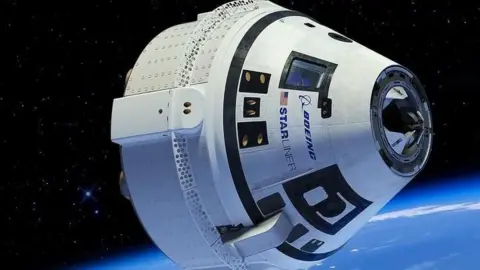Astronauts Butch Wilmore and Suni Williams were already in position inside the Starliner when the decision to halt was made because of a potential issue with an oxygen relief valve in the Atlas rocket run by the United Launch Alliance.
There was no issue with Boeing's Starliner Spacecraft which sits on top of the rocket.
Flight engineers discovered that the valve had been rapidly opening and closing in the period before launch and so the countdown was aborted.
The Starliner's first uncrewed test flight was originally scheduled to take place in 2015 but ended up being delayed until 2019. When it did occur, software glitches led to an internal clock malfunction, resulting in thrusters over-firing. So much fuel was consumed that the capsule was unable to reach the ISS.
A second attempt was planned in August 2021 but delayed again until May 2022. An issue with the propulsion system was blamed. When Starliner finally did leave Earth, it managed to complete its full mission but concerns were raised about the performance of some thrusters and the craft's cooling system.
The flight team are currently examining the data to see how much energy was expended by the valve. If it has exceeded its operational life it will need to be replaced, which ULA say its engineers can do in a few days.
The spacecraft had been expected to blast off from Cape Canaveral in Florida and make its way to the International Space Station (ISS).
The soonest a new launch attempt may be made is on Friday, Boeing said in a post on social media.
The mission has already been delayed for several years because of setbacks in the spacecraft's development.
"Standing down on tonight's attempt to launch," tweeted Nasa chief Bill Nelson. "As I've said before, @NASA's first priority is safety. We go when we're ready."
Boeing is hoping to become the second private firm able to provide crew transport to and from the ISS, alongside Elon Musk's SpaceX.
Mr Musk's company was the first to achieve this in 2020 with its Dragon capsule, in a flight that ended close to a decade of US reliance on Russian space rockets.
 Boeing
BoeingBoeing's first crewed space flight was postponed just two hours before launch for a safety check, Nasa officials say.
